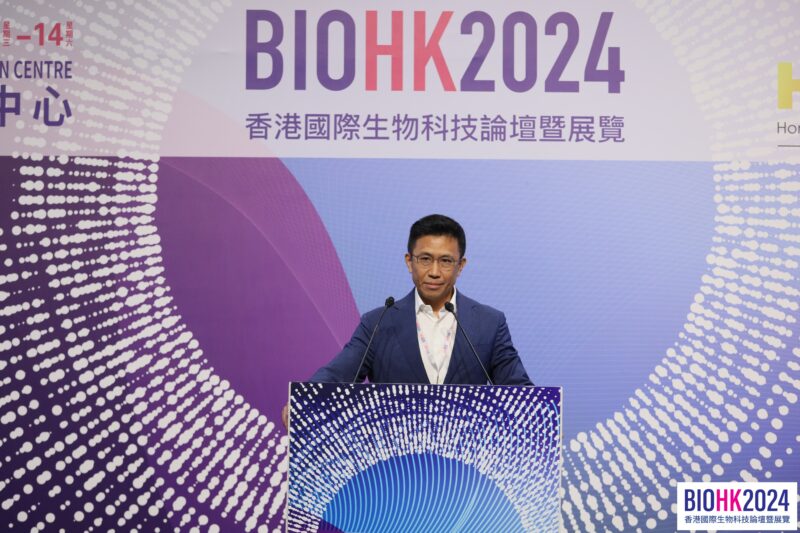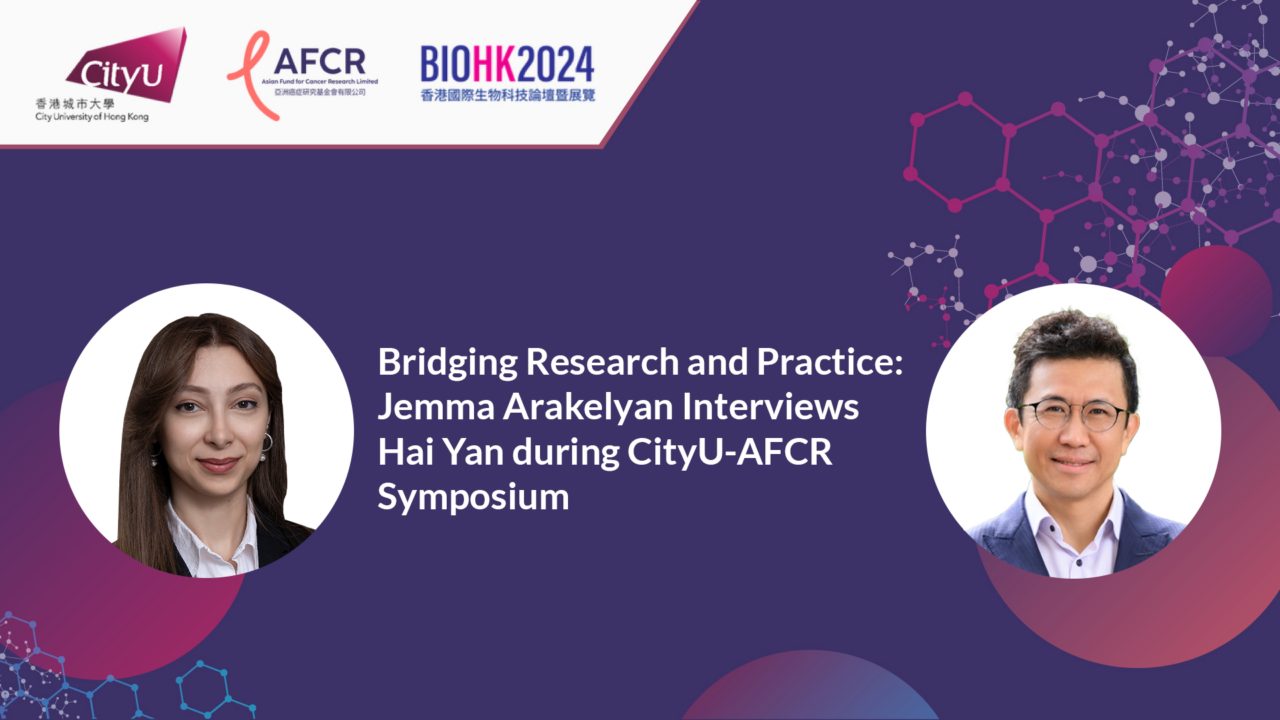During the CityU-AFCR Symposium at BioHong Kong 2024 on September 12-13, Dr. Jemma Arakelyan interviewed Dr. Hai Yan, a Research Director at A*Star in Singapore.
Dr. Jemma Arakelyan is a medical oncologist and the Chief Executive Officer of The Institute of Cancer and Crisis. Under her leadership, the Institute is dedicated to raising awareness and providing support for cancer patients facing critical challenges, including those arising from war and pandemics. Currently, she is pursuing her Ph.D. at the City University of Hong Kong, focusing on the development of new anticancer treatments and the mechanisms driving cancer progression.
In addition to her academic work, Dr. Arakelyan is actively involved in several scientific organizations, including the European School of Oncology (ESO), the European Society of Medical Oncology (ESMO), and the American Society of Clinical Oncology (ASCO). She also serves as an advisor at the Immune Oncology Research Institute, where they work closely on the clinical development of novel immunotherapeutic agents.
Dr. Hai Yan is a Research Director at the Institute of Molecular and Cell Biology at A*Star in Singapore, where he specializes in cancer biology and biomarker research. He holds a Bachelor’s degree from Peking University Health Science Center and earned his PhD from Columbia University’s College of Physicians and Surgeons. He also completed a postdoctoral fellowship at Johns Hopkins University School of Medicine.
Over the years, Dr. Yan has received several prestigious awards, including the AACR Team Science Award and the International Prize for Translational Neuroscience.
He was also named the Henry S. Friedman Distinguished Professor of Neuro-Oncology at Duke University in 2014. In addition to his research, he co-founded Genetron Health.
CityU-AFCR Symposium on Precision Medicine and Digital Medicine took place from 12-13 September as part of BIOHK2024, in Hong Kong Convention and Exhibition Centre. The symposium showcased presentations by experts in precision medicine, providing a dynamic platform for the exchange of innovative ideas and fostering a collaborative environment for advancements in the biotechnology field.
During CityU – AFCR Symposium Hai Yan presented a topic named ‘Diagnosis and Targeted Therapy of Gliomas with IDH1 and IDH2 Mutations.’
Isocitrate dehydrogenase (IDH) mutant gliomas are the most common adult, malignant primary brain tumors diagnosed in patients younger than 50, constituting an important cause of morbidity and mortality. In recent years, there has been significant progress in understanding the molecular pathogenesis and biology of these tumors, sparking multiple efforts to improve their diagnosis and treatment.

Jemma Arakelyan: Dr. Yan, as a co-founder of Genetron Health and a venture partner, what challenges and opportunities do you see in bridging the gap between industry and research and practical world?
Hai Yan: We have been doing precision medicine for more than 10 years. It is basically using the genetic data and learning from cancer patients themselves, to guide not only on the routine treatment, what kind of drug the patient needs to receive, but also for future drug development.
By understanding the genetic profile of the patients, we can design better drugs for personalized medicine. Not that many drugs have been developed and to fulfill the purposes. Tumor suppressor genes, oncogenes, you have like 300 of them and when you do the sequencing, you can find 50 to 100 patients in each cancer patient. But, many of that information has not been leveraged and to guide the treatment. In the future, to develop the off-shelf drugs and the particular targeting of those patients which have not been drugged, there will be huge challenge in this path.
Jemma Arakelyan: You have mentored many young professionals. What’s your advice for younger generation in this field of biotechnology?
Hai Yan: Biotech is a new field and especially for the Asian population, which is genetically quite different. We do need Chinese people to study biotechnology patients and to address clearly a lot of unmet needs. With AI people cross-field from different areas, computer science and bioinformatics and chemists, geneticists, biologists. If we work together, we can really activate the whole process of drug development.
Jemma Arakelyan: Can you elaborate on the significance of your discoveries related to IDH1 and IDH2 mutations?
Hai Yan: It took about 15 years from the discovery of IDH1 and IDH2 mutations in low-grade.
With this drug, patient’s progression-free survival have been prolonged from 11 months to 28 months. This will be the first ever targeted therapy in brain cancer. It sets up a new standard of treatment for glioma patients and is different from using kinase inhibitor as a targeted therapy.
This drug is very mild and valid. Compared with chemotherapy, kinase inhibitor, this one is a “softer” drug, but it works very well. It is a whole new field for industry to figure out why target metabolic changes being so effective and the general effect of the drug on human body is really fascinating.
Jemma Arakelyan: Very interesting. Good luck, Dr. Yan and thank you for your time.
Find other posts featuring the CityU-AFCR Symposium


